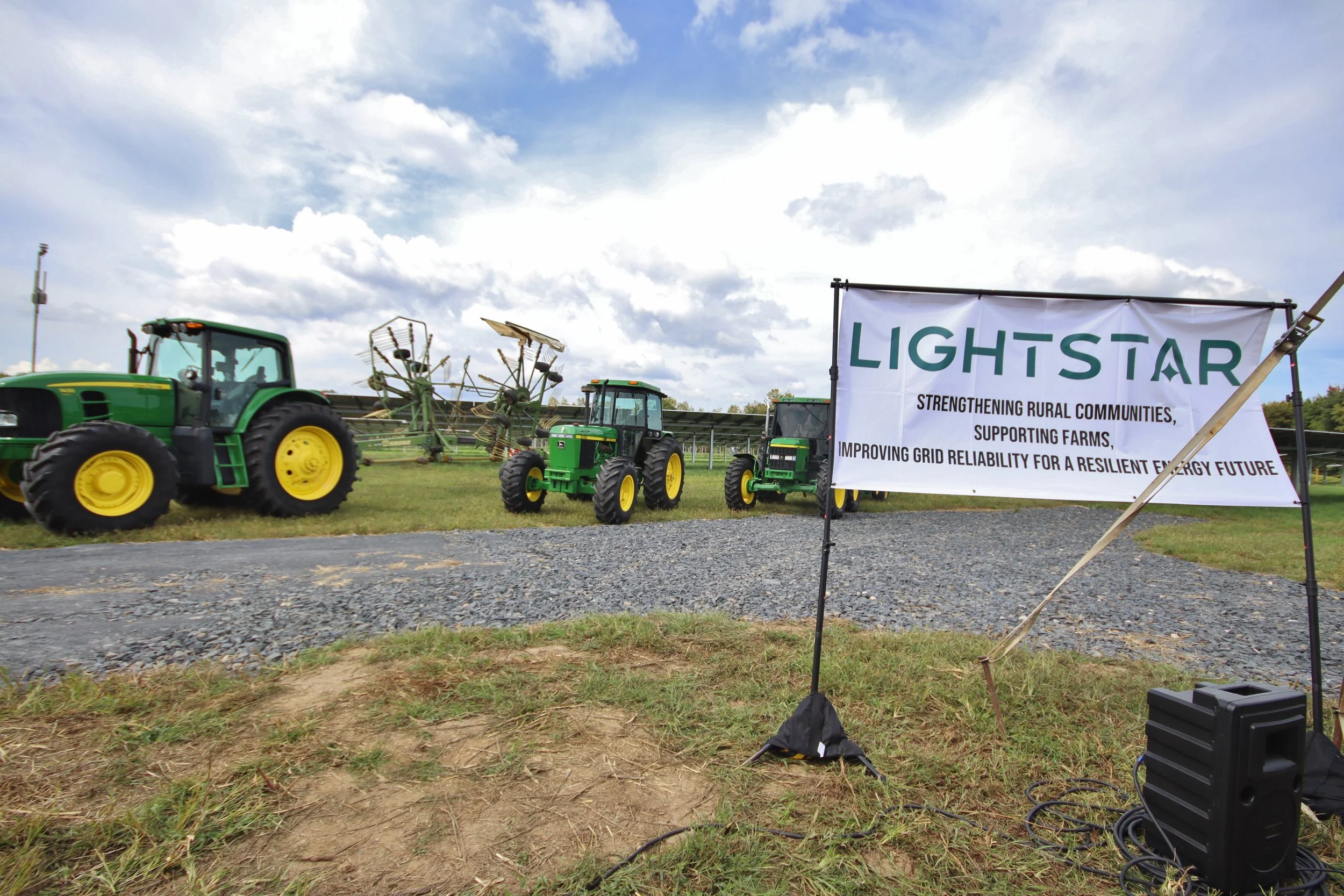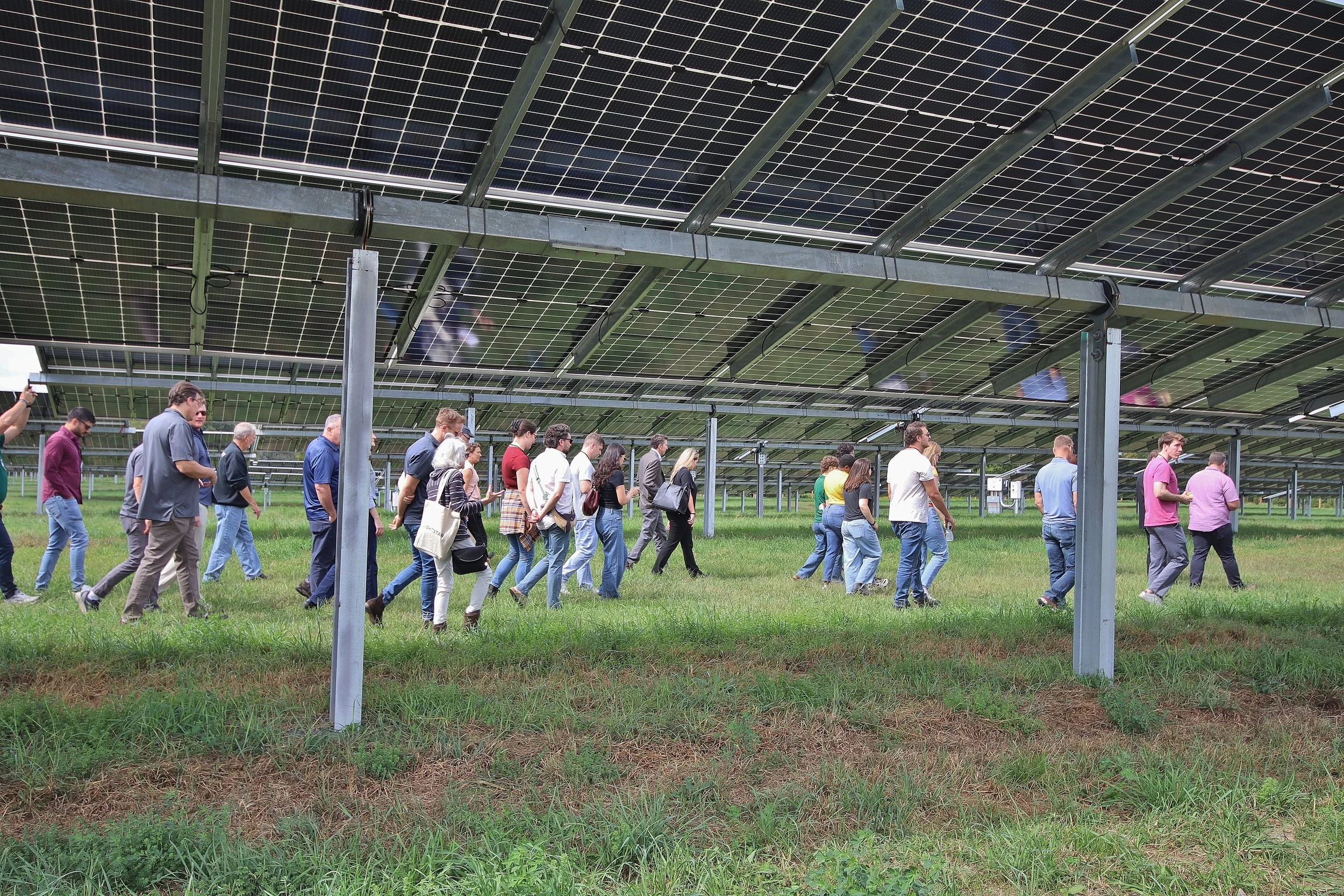New York awards $7 million for co-located solar and farming
Learn how NY's $7M investment in agrivoltaics supports sustainable farming. Discover how Lightstar's clean energy projects help farmers and the planet.
If The White House Won’t Save US Farmers, Agrivoltaics Will
Discover how agrivoltaics is transforming sustainable farming. Learn how combining clean energy with agriculture offers new economic benefits for farmers.
Illinois Supercharges Clean Energy with New CRGA Bill
Discover how the new Clean and Reliable Grid Affordability Act (CRGA) in Illinois is expanding community solar, funding battery storage, and driving clean energy growth.
Supporting Farmers Is Key to Combating the Climate Crisis
On Tuesday morning, September 23, Food Tank hosted “Keeping Farmers on the Land,” a Climate Week NYC Summit in partnership with American Farmland Trust. The invitation-only event explored farmers’ critical role in advancing climate solutions, and the tools and policies needed to help them thrive—from soil health and land protection to agrivoltaics and smart solar strategies.
A New Season for Farming and Energy: Lightstar Celebrates Plains Road Agrivoltaics Project
Lightstar Renewables LLC proudly announces the launch of the Plains Road Agrivoltaics project, an initiative that seamlessly integrates solar energy production with agricultural use on the DiMartino Farm in Montgomery, New York. The agricultural consultant on the project was Solar Agricultural Services, Inc. (SolAg). This project demonstrates the new way farmers can both feed and fuel New York state - a forging together of both needed clean energy generation and vital agricultural production.
PRESS RELEASE: Lightstar Renewables Celebrates Successful Launch of New York's First Agrivoltaics Project
Lightstar Renewables LLC proudly announces the launch of the Plains Road Agrivoltaics project, an initiative that seamlessly integrates solar energy production with agricultural use on the DiMartino Farm in Montgomery, New York. The agricultural consultant on the project was Solar Agricultural Services, Inc. (SolAg). This project demonstrates the new way farmers can both feed and fuel New York state - a forging together of both needed clean energy generation and vital agricultural production.
As Federal Support for On-Farm Solar Declines, Is Community Agrivoltaics the Future?
Lightstar Renewables LLC proudly announces the launch of the Plains Road Agrivoltaics project, an initiative that seamlessly integrates solar energy production with agricultural use on the DiMartino Farm in Montgomery, New York. The agricultural consultant on the project was Solar Agricultural Services, Inc. (SolAg). This project demonstrates the new way farmers can both feed and fuel New York state - a forging together of both needed clean energy generation and vital agricultural production.
PRESS RELEASE: Lightstar Renewables Launches Innovative Agrivoltaics Project in Montgomery, New York
Lightstar Renewables LLC proudly announces the launch of the Plains Road Agrivoltaics project, an initiative that seamlessly integrates solar energy production with agricultural use on the DiMartino Farm in Montgomery, New York. The agricultural consultant on the project was Solar Agricultural Services, Inc. (SolAg). This project demonstrates the new way farmers can both feed and fuel New York state - a forging together of both needed clean energy generation and vital agricultural production.
Solar energy growth won’t eat into farmland, U of A study finds - Arkansas Times
New research from the University of Arkansas shows that even with an extreme ramping up of solar energy infrastructure, only a tiny fraction of agricultural land would likely be taken out of production to harvest sunlight instead.
Brianna Fiorillo, Policy & Strategy Manager, Midwest at Lightstar weighs-in.
Republican lawmakers retry bill to bring community solar to Ohio
Deep in the UP, an abandoned mine could offer hope for green energy fights.
Brianna Fiorillo, Policy & Strategy Manager, Midwest at Lightstar weighs-in.
Agrivoltaics Make The Leap From Rural To Urban Farming
Urban farms can be anchors of community resiliency, supporting food availability, economic opportunities, and educational activities, too. Now, the City of Detroit has embarked on a plan to add clean power to the list of benefits. The Solar Neighborhoods program incorporates agrivoltaics, enabling the city move forward with decarbonization goals for municipal operations. Partners in the project already anticipate that it will provide a model for similar programs in cities across the US.
House Policy Shift Risks Rural Farm Income and Solar Growth
Urban farms can be anchors of community resiliency, supporting food availability, economic opportunities, and educational activities, too. Now, the City of Detroit has embarked on a plan to add clean power to the list of benefits. The Solar Neighborhoods program incorporates agrivoltaics, enabling the city move forward with decarbonization goals for municipal operations. Partners in the project already anticipate that it will provide a model for similar programs in cities across the US.
Supporting Farming Families and Renewable Energy Initiatives
It's crucial to reach out to your Senators today! Voice your support for America's farming families and their communities by advocating for the preservation of investment tax credits.
Lightstar Stands with America’s Farming Families to Defend Rural Property Rights, Agricultural Resilience, and American Energy Independence.
Lightstar reaffirms its unwavering commitment to America’s farming families as federal proposals threaten to undermine a vital farm viability and succession planning tool for America’s farmers – the long-standing technology neutral investment tax credit (ITC).
The “Big Beautiful Bill” Threatens Farming Families and Property Rights - At the Heart of American Agriculture.
Farmers in America stand at a crossroads. The “Big Beautiful Bill”, as passed out of the House this morning, threatens both the financial stability of farming families and the property rights that lie at the heart of American agriculture. This bill would immediately take away farming families’ choice to utilize a portion of their property for solar or agrivoltaics.
As Tax Credits Face Repeal, Farmers Are Under Threat
At the Solar and Farming Association (SAFA), we stand firm in advocating for policies that empower rural farmers and advance sustainable energy solutions. The phase out of clean energy investment tax credits poses a significant threat to innovative American farmers who rely on agrivoltaics to sustain their livelihoods, diversify income streams, and preserve their land.
With agrivoltaics, solar farms can add wheat, sheep as new cash crops
Solar energy developers are increasingly looking to open their facilities to another type of farming: crops and livestock.
Agrivoltaics, the dual use of land for solar energy generation and agricultural production, is getting more attention, according to a July 2024 report released by the Solar and Storage Industries Institute. More than 70% of farmers are open to large-scale solar projects on their properties if system designs allow for continued agricultural production, according to the report.
Diversification on the farm - Agrivoltaics to survive economic uncertainty and extreme weather
Agrivoltaics doesn’t just benefit individual farmers; it strengthens rural economies as a whole. By choosing agrivoltaics, you’re creating jobs for solar system installation and maintenance. The revenue generated can circulate back into your local community, supporting businesses, infrastructure development, and economic growth.
Statement on SF 2855 and the Future of Community Solar Gardens in Minnesota
Lightstar opposed proposed legislation in MN: Lightstar supports the current program dates and MW allocations in Minnesota Statutes 2024 for steady growth: 80MW from 2027-2030, and 60MW from 2031 onward. Our long-term commitment to Minnesota means the proposed end of the community solar program in SF2855 after 2028 would limit our project completion and future investments.
Brianna Fiorillo, Policy & Strategy Manager, Midwest at Lightstar weighs-in.
Agrivoltaics headed to Baltimore County?
FREELAND, Md. — A proposed solar farm in northern Baltimore County could become one of Maryland’s first agrivoltaic projects, integrating crop production with renewable energy generation.




















